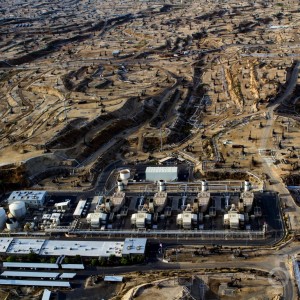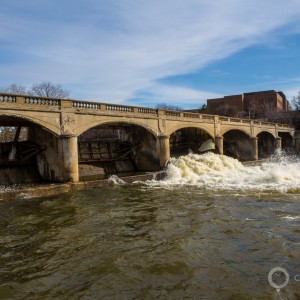Federal Water Tap, January 11: U.S. Officials Begin Scrutinizing Flint Water Crisis
The Rundown
Federal officials eye Flint. The Army Corps opens a rarely used Mississippi River spillway. The Bureau of Reclamation reconsiders a Yellowstone River dam and signs a water agreement for the Truckee River. A New York congressman calls for more federal dollars for water infrastructure. The Agriculture Secretary supports an Iowa sales tax. Draft Glen Canyon Dam plan is published. The State of the Union is Tuesday.
“In an effort to address the concerns of Flint residents, the United States Attorney’s Office for the eastern district of Michigan is working closely with the EPA in the investigation of the contamination of the City of Flint’s water supply.” — Gina Balaya, spokeswoman for the U.S. Attorney’s Office in Detroit.
By the Numbers
1.25 million cubic feet per second: Flow of the Mississippi River through New Orleans. By opening the Bonnet Carre Spillway, which diverts water through Lake Pontchartrain, the Army Corps hopes to keep the river from going above that level. (Army Corps)
372: Water main breaks in Syracuse, New York in 2015. The mayor and Rep. Paul Tonko (D-NY) held a press conference to call for more federal funding for water infrastructure repairs. (Syracuse.com)
Studies and Reports
CRS Reports
The Congressional Research Service, which provides policy summaries to Congress, issued a number of reports related to water:
- on the Clean Water Rule, which defined which water bodies were covered by the Clean Water Act;
- on water pollution issues before Congress;
- and on legislation and decisions in 2016 that will affect the Army Corps and its projects, including reservoir operations in the drought-weary American West and water supply allocation in river basins shared by Alabama, Florida, and Georgia.
In the water pollution report, the author notes that “there is little agreement among stakeholders about what solutions are needed, whether legislation is required to address the nation’s remaining water pollution problems, or whether regulatory authorities should be reduced.”
News Briefs
Flint Scrutiny
The U.S. Attorney’s Office is investigating the lead contamination of drinking water in Flint, Michigan, according to the Detroit Free Press. The office typically does not comment on ongoing investigations, but it did so because of overwhelming public interest.
Meanwhile, three Federal Emergency Management Agency officials have been sent to Flint, at the request of the state police, the Detroit Free Press reports.
Army Corps Opens Spillway
For the eleventh time since it was built in 1931, the U.S. Army Corps of Engineers opened the Bonnet Carre Spillway, which protects New Orleans from flooding. The spillway, located upstream of the city, diverts a portion of the Mississippi River into Lake Pontchartrain.
The Army Corps expects to keep the spillway open for at least a week, until flood waters subside.
Iowa Water Plan
Iowa Governor Terry Branstad proposed extending a one-cent state sales tax and using a portion of the revenue — $US 4.7 billion over 32 years — to fund projects to reduce water pollution, the Des Moines Register reports. U.S. Agriculture Secretary Tom Vilsack, a former Iowa governor, stood with Branstad at the press conference.
The state has been roiled in the last year by a Clean Water Act lawsuit against three farm counties over nitrate pollution in rivers. Des Moines Water Works, the capital’s water utility, filed the lawsuit last March.
“The Des Moines Water Works lawsuit brought attention and focus to this issue, but I suspect that all of us believe that the ultimate resolution of our water quality issues ought not to be in a courtroom,” Vilsack said, according to Radio Iowa. “It ought to be in a collaborative and cooperative effort…That’s why I’m here today because I believe in that approach.”
Truckee River Agreement
State, tribal, and federal officials in Nevada signed an agreement for managing the Truckee River — after more than a quarter-century of conflict, the Reno Gazette-Journal reports. The agreement allocates water between California and Nevada and allows for greater flows into Pyramid Lake to protect endangered sucker fish.
On the Radar
State of the Union
White House aides are hinting that Tuesday’s State of the Union speech will test a new approach.
Instead of detailing short-term policy goals, the president will use the grand stage to talk about America’s position in the 21st century, according to Josh Earnest, the White House press secretary.
“The eyes of the nation are focused on that moment,” Earnest said, referring to the State of the Union speech. “And the question is how is the president going to use that unique opportunity. And in this case, he wants to focus most of his time on the opportunities and challenges that lie ahead for the country, and how the choices that we make today will have a significant impact on the success of future generations of Americans.”
Expect the Paris climate agreement and climate change to be mentioned.
Second Thoughts on Yellowstone Dam
The Bureau of Reclamation, after being sued by environmental, is considering alternatives to a $US 59 million dam on the Yellowstone River that would block spawning habitat for endangered sturgeon. The Associated Press reports that a U.S. district judge is requiring a new environmental review be completed by the end of 2016.
Glen Canyon Dam Operation
The Bureau of Reclamation published the draft environmental review for the 20-year management plan for Glen Canyon Dam, one of the nation’s largest, on the Colorado River.
Areas of focus include: high-flow experiments to mimic pre-dam floods and rebuild sandbars and riverside habitat; fish and vegetation management; protection of historic Indian tribe sites in the canyon; and providing hydroelectric power and downstream water supplies.
Public comments are being accepted through April 7, via this link.
The U.S. Geological Survey conducted a scientific analysis to guide the management plan.
Federal Water Tap is a weekly digest spotting trends in U.S. government water policy. To get more water news, follow Circle of Blue on Twitter and sign up for our newsletter.
Brett writes about agriculture, energy, infrastructure, and the politics and economics of water in the United States. He also writes the Federal Water Tap, Circle of Blue’s weekly digest of U.S. government water news. He is the winner of two Society of Environmental Journalists reporting awards, one of the top honors in American environmental journalism: first place for explanatory reporting for a series on septic system pollution in the United States(2016) and third place for beat reporting in a small market (2014). He received the Sierra Club’s Distinguished Service Award in 2018. Brett lives in Seattle, where he hikes the mountains and bakes pies. Contact Brett Walton






Leave a Reply
Want to join the discussion?Feel free to contribute!